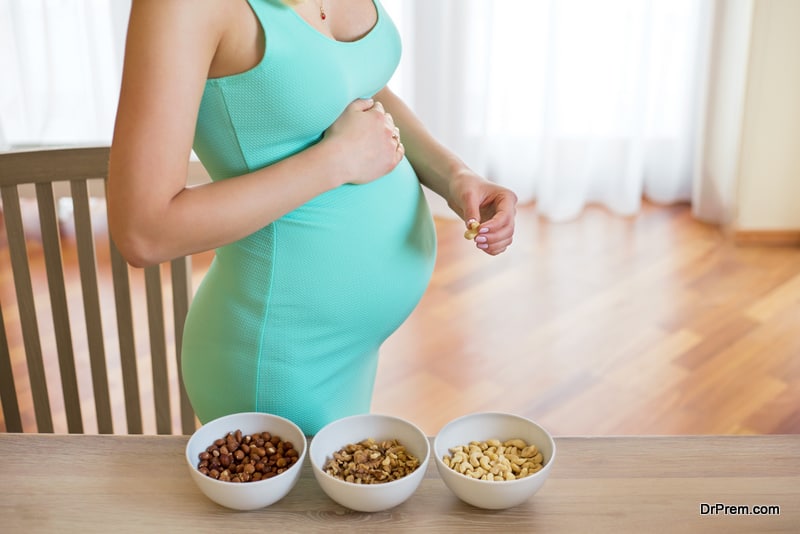During your pregnancy, a growing fetus has only one source of food, that is you. During this time, it is very essential to consume a varied and well-balanced diet. Carrying a baby inside your womb does not necessarily mean that you have to eat for two people. All you have to do is to eat a variety of fresh, unprocessed food to ensure that you and your growing baby get all the nutrients and minerals in the right quantities. Remember, any deficiency of vitamins and nutrients occurring in you, during pregnancy, automatically gets passed on to your growing baby. Be careful and conscious enough in the selection of your daily food items for a safe pregnancy and a healthy baby.
Berries
Berries are a good source of vitamin C, potassium, folic acid and fiber, which should necessarily be a part of your daily diet during pregnancy. Being rich in fiber, it prevents constipation, which is quite common in pregnant women. The presence of folic acid in berries is very beneficial for the fetus growth and the vitamin C and potassium content help to build a strong placenta, which in turn enables your body to resist infections. You can have blueberries, blackberries or raspberries as snacks with pancakes or as a topping on the cereal.
Beans
Beans are exceptionally good for heart. Black beans, white beans, lentils, soy beans, including garbanzo and kidney beans, along with sprouts and legumes are a great source of protein and fiber. These are also rich in key nutrients like iron, folic acid, calcium and zinc. You can have them in form of salads, soups or pastas. Avoid eating baked beans as they contain insoluble fiber which move to the large intestine or colon, where bacteria acts on it, thereby producing fatty acids and making it difficult to digest.
Milk
Milk is a crucial part of a pregnant woman’s diet. It contains proteins, calcium and vitamin D which helps in providing relief from renal colic and stomach ache, thereby improving digestion and increasing her appetite. Its intake is important to ensure the healthy development of the baby’s bones and teeth. However, one should be careful enough to opt for organic milk as it is produced with no use of antibiotics or artificial hormones and pesticides. Organic milk also acts as an additional source of omega3 and beta-carotene.
Red Meat
Red meat is full of iron, vitamins and nutrients which are essential during pregnancy. However, choose organic meat as it is leaner and rich in omega3. It plays a vital role in the development of the fetal brain. Research shows that women, who consumed foods rich in omega3 during their pregnancy, report higher attention spans in their children, as compared to other infants.
Coconut Water
A pregnant woman gains more than 15 pounds of water, as her blood volume expands to create enough amniotic fluid to support the growing fetus. It is very important for her to have at least 8 cups of fluids on a daily basis, including water and other non-caffeinated drinks. Coconut water plays a vital role in providing natural electrolytes such as potassium which supports circulation and also, as a source of fluid in the form of a natural energy drink. It should definitely be included as an inevitable part of the diet during pregnancy.
Yogurt
Yogurt provides proteins, calcium and probiotics to assist the building bacteria that supports and strengthens the immune system, balance blood glucose and retain it at a healthy level. It even improves and enhances the digestive tract and provides relief from constipation.
Fruits and vegetables
Fruits and vegetables are a packed source of essential nutrients and fibers, and therefore should be taken in abundance during pregnancy. You should include at least three varieties of vegetables and two fruits as a part of your daily diet during pregnancy, along with a fruit juice which contains high levels of Vitamin C, like orange or apple. Green leafy and yellow vegetables as well as yellow fruits contain vitamin A, crucial for the growth of cells, healthy skin, bones and eyes of the developing fetus. Spinach is a very good source of iron and contains lutein content which protects and ensures healthy development of the eyes.
Cranberries
During pregnancy, it is natural for a woman to be exposed to greater risks of urinary tract infections. Cranberries play the role of natural antibiotics in the urinary tract by supplying special nutrients. It reduces the capacity of bacteria to stick to the walls of the urinary tract.
Hazelnuts and whole meal bread
Hazelnuts and whole meal bread are rich in folic acid, much needed for the development of the baby’s central nervous system, especially in the first few weeks. Folic acid is destroyed by over cooking or prolonged storage. So, it is best to have it raw, in the form of nuts or whole meat bread, prepared as sandwiches for your morning breakfast or other snack times.
Fish and Algae
Fish and Algae are very nutritious and contain omega3 fatty acids which support the healthy development of the baby’s brain as well as the circulatory system. You should include one portion of it during lunch or dinner to ensure a healthy mind of your little bundle of joy.



